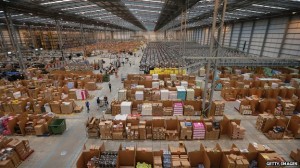A New Golden Age of MONOPOLY
Amazon is the shining representative of a new golden age of monopoly that also includes Google and Walmart (Franklin Foer). This can be proved by the truth that shopping on Amazon has been an inerasable habit of modern American life. Why Amazon is so successful? Today’s monopolies, like Amazon, take advantage of their high profits and dominance to drive down their prices. Lower prices, obviously have become a financial incentive that attracts more customers, and also a barrier of other competitors. Besides, Amazon, focusing on its operation management, provides customers with faster deliveries, better warranty policy and especially, cheaper goods. Not only more profits for capitalists, but more benefits for customers are the main difference between Amazon and old-style monopolies, like JP Morgan’s US Steel. In Thiel’s phrasing: “Creative monopolies are not just good for the rest of society, they are powerful engines for making it better.” In this sense, to be better, to provide better products and to make the society better, Amazon, as well as other modern monopolies is the shining representative of a new definition of monopoly and a new golden age of monopoly.




